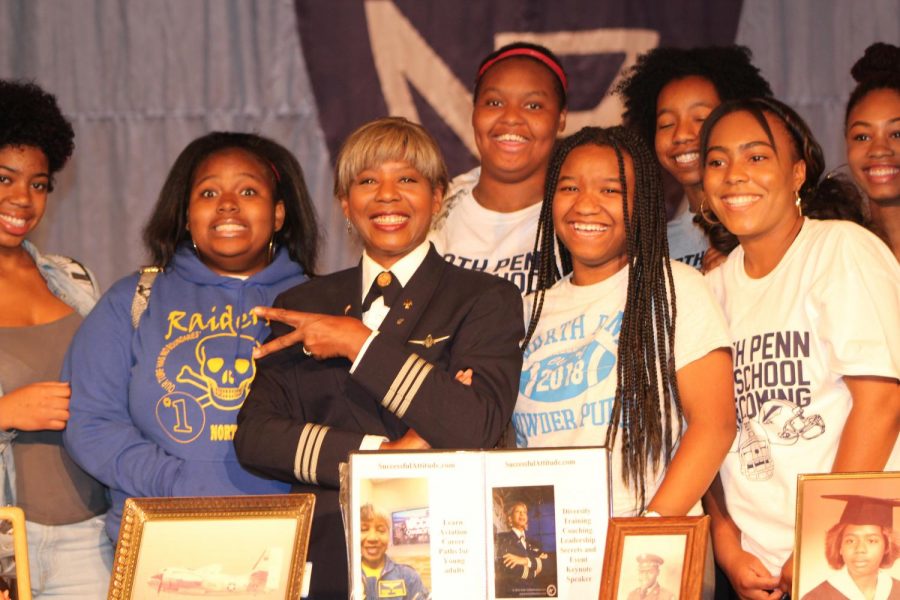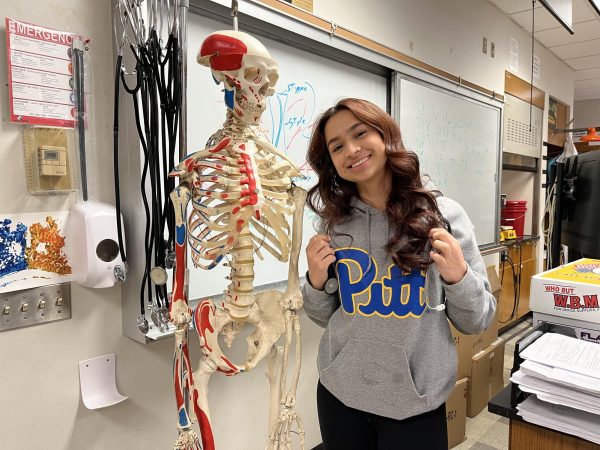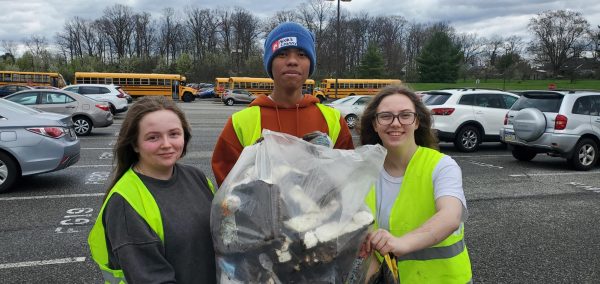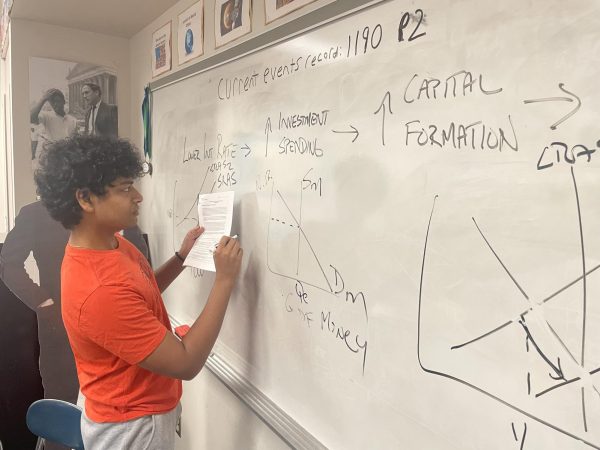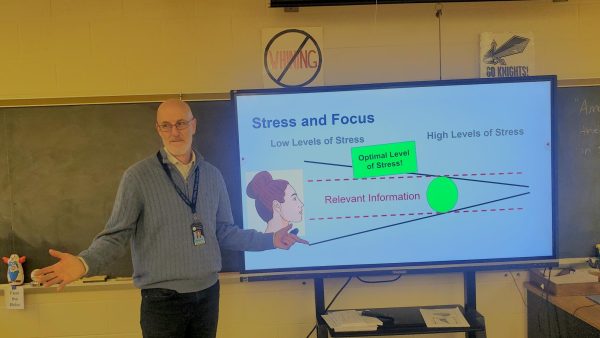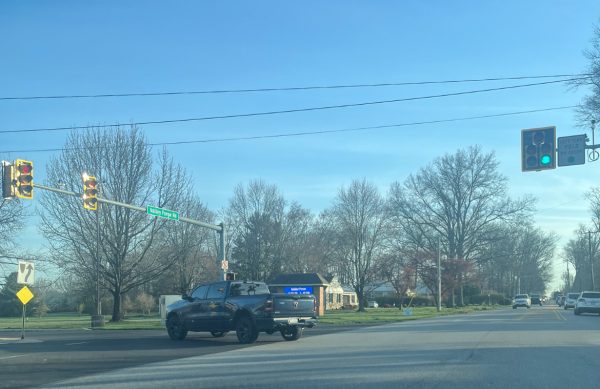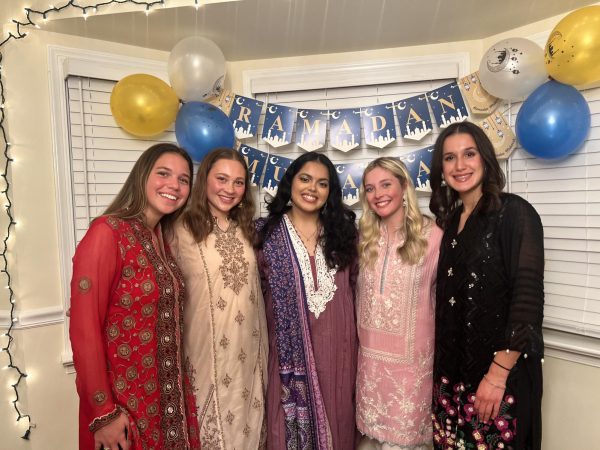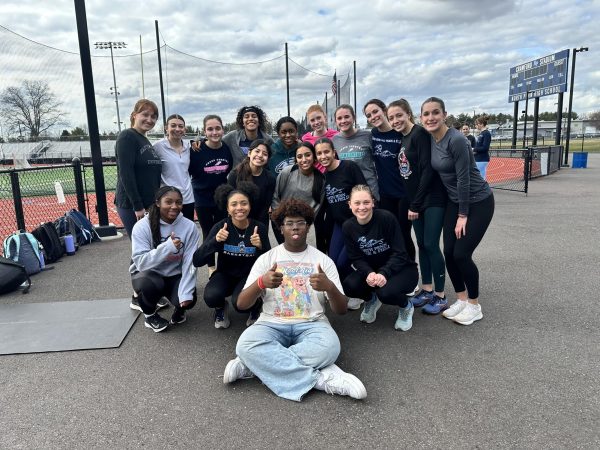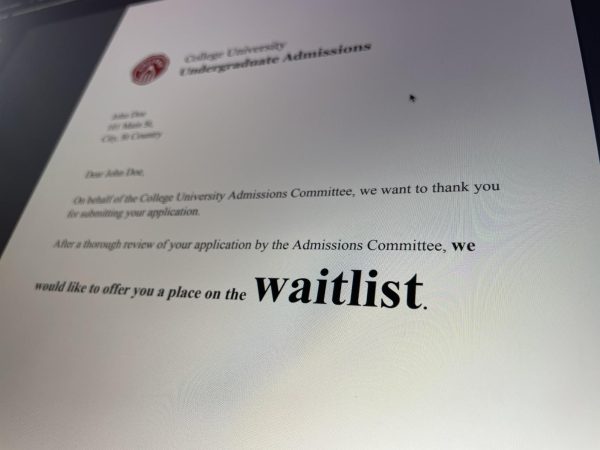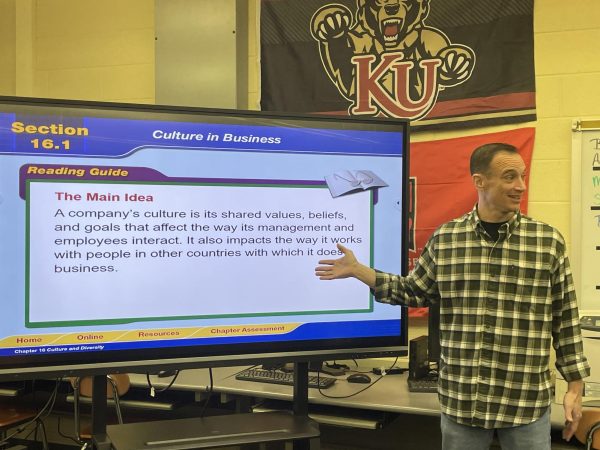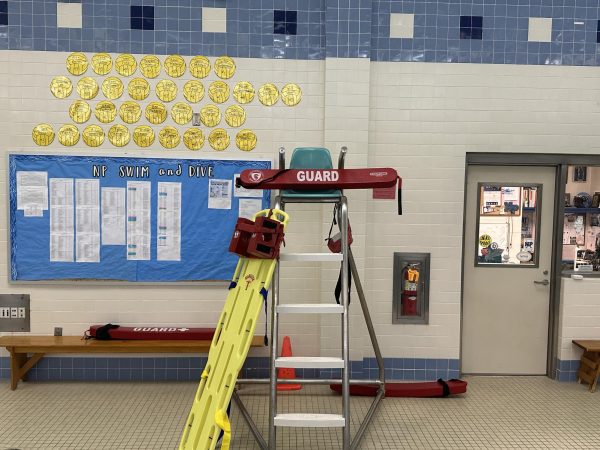Aviation Pioneer Inspires North Penn Students
North Penn alumni Brenda Robinson returns to speak on her life experiences.
TOWAMENCIN- When people think of aviator Brenda Robinson most cite her many accomplishments and numerous firsts in her field. What they often don’t know is that her journey to success started here in the halls of North Penn High School. As a proud graduate of the class of 1974 and this year’s recipient of the North Penn Alumni Athletic Association Lifetime Achievement Award, Robinson returned to her Alma Mater to speak about her life experiences. The award honors distinguished North Penn alumni for their significant contributions to society in the Arts, Businesses, Education, Legal, Medical, Performing Arts, Public Service, or the Sciences.
Robinson, who is the first African American military woman inducted into the Women Aviation Hall of Fame, was inducted in 2016. Her interest in aviation began innocently enough at an airport as a child.
“When I was a kid, when you went to the airport to pick somebody up, you went in your Sunday best. You got all dressed up, you parked your car, you go into the airport, you go all the way to the gate, you know, no big deal, and you sit there patiently waiting for the airplane to come in. Then the airplane would come in, they’d roll the stairs up, you’d walk down the stairs….it’s like the glamour life. The glamour people coming down the stairs because they have just come from some place and they flew to get here. I was just impressed with that. I just thought it was the most amazing thing ever and I was like ‘I want to do that. I want to get on that airplane.’ I didn’t think about flying it as a pilot, I just wanted to be on that airplane,” shared Robinson.
North Penn initiated a career study program right around the time when Robinson, a one time marching band and concert band member, was finding her passion. She was able to study different careers in aviation. Robinson went to Wings Field in Blue Bell, PA, every school day for half a day. Here she was afforded the opportunity to fly in helicopters and go to the Air Traffic Control Tower in North Philadelphia.
“The very first [experience] was a helicopter ride. They told me that they were going to fly over my neighborhood, so I called up my dad and was like, ‘Dad, they’re going to fly over the house!’”
She knew little of the military at this point and had even less interest in joining, “I didn’t know anything about the military at all and I was not going in it.” Her supportive parents instilled in her that she could accomplish anything she set her mind to. They encouraged that college be a part of whatever future plan she made.
“You can do anything and you’re going to college,” her World War II Veteran dad Edward Robinson would say.
She didn’t physically start flying until she reached college. She studied aeronautics at Dowling College in Oakland, New York, where she later received her degree. She also studied airport management, physics, calculus, aerodynamics, electricity, and flying. She took flying lessons and classes separately because it was not a part of the curriculum.
Her first solo flying experience happened while she was in college.
“The instructor got out, and I took off down the runway and rose into the sky like an elevator,”
After I got the airplane under control, I was laughing. I was so giddy. I was like ‘this is like the coolest thing ever!’ That was so nice. So cool and so quiet.
— Brenda Robinson
“After I got the airplane under control, I was laughing. I was so giddy. I was like ‘this is like the coolest thing ever!’ That was so nice. So cool and so quiet. [The instructor] was talking all the time you know? It was so quiet, but I could hear his words in my head constantly. When to turn, what paraset, what nose attitude, where am I, call on the radio, talk to this, do that. I heard him the entire time, but yet it was still quiet. It was awesome it was like the best experience ever,” shared Robinson.
At the time, she had no specific plan for her flying ability; she just knew she wanted to fly.
“I didn’t even know about the military until they actually came to my school.”
No one in her family is a pilot, and the fascination of flying seemed to come out of nowhere. Her dad, Edward Robinson, who is now ninety-one years old, was in infantry transportation when he served in the military. During his service, the military was segregated and blacks were not treated as equals.
“He could take a truck a part all the way down to the bolts and put it back together again. So, that was his training. He was in Germany fighting the war there,” she bragged about her dad.
“[My parents] were kind of starting to push me towards the Air Force because the Air Force really treats their folks really well. They figured they had friends in the Air Force, and the Air Force is treating them well, so I should go into the Air Force. When that panel of folks came to my college, I picked out Navy, so I had to be very grown up about how I was going to inform my parents that I was going to go into the navy. The Navy took me on this trip down to Florida, showed me around, brought me back. Before I got off that airplane, I knew I was going into the Navy, but I couldn’t tell my parents that.”
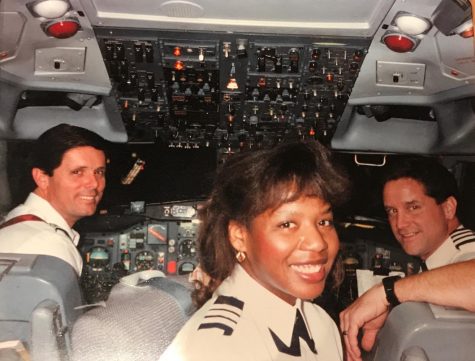
Brenda Robinson in the cockpit
The military was predominantly white and the similar atmosphere at North Penn at the time prepared her to work well with people of different races.
“The military was all white men. They were just allowing minorities to start flying in the navy, and they had just opened the door to women in the military. So I’m going in there and all of these people that don’t look like me didn’t bother me at all, and they’re thinking that they can maybe intimidate me into dropping out, disappearing, or going away. And I’m like no, this is my new home, I’m here.”
She flew missions during Operation Desert Shield and Desert Storm in the Gulf War.
“Sitting in the briefing room and being briefed on the security about what’s really happening in the world as opposed to what the news organizations are allowed to say, it’s terrifying. You’re sitting there going ‘oh my god and we have to fly into the middle of this.’ It was stressful, but at the same time, the Navy trained me to do a specific job and all I had to do was do that job it’s not like I had to think about this. All I had to do was the job that they trained me to do, which I thought was very cool, and you know I’m just going to do that. I wasn’t really thinking about all the things that could go wrong because I already had a job to do, and that’s really how I got through the whole time,” said robinson.
In her twenty years as a navy pilot, she flew many planes. In the beginning, she flew props, then moved into small jets and then got into bigger jets. As her career went on, she went up to flying VIPs and landing on aircraft carriers.
As an African-American woman, she has had many firsts. Some of the well highlighted include being the first female African-American pilot to earn her wings of gold as a naval aviator and the first to be certified for aircraft carrier landings.
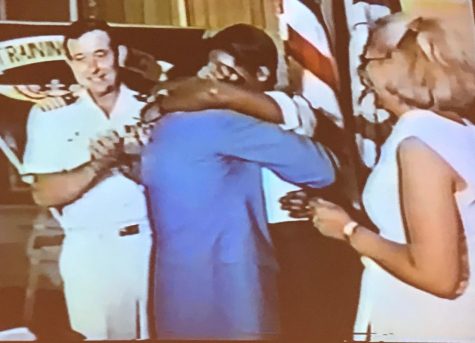
A young Brenda Robinson officially becoming the first African-American female naval aviator embraces her father
“I was in the right place at the right time, because before I got to college, they were totally restricted. [As a] black woman, no way was I ever going to be allowed to even apply. When they did hire me I was one out of ten women out of the nation that they allowed in that year, and after that it was ten, and after that they started to open it up a little bit more.”
“It was the law that had to change, and my timing was perfect because when I was getting out of college, I had an aeronautics degree and I had my private pilot’s license. Now, if you were a guy and you were going into the Navy to be a pilot, you just had to have a degree in anything. My degree had to be based in science so I was overqualified and I got that position. But when I got that position and they told me ‘you know what? You’re going to be the first black woman pilot to do that.’ Well that was so far off into the future that if I spent my time going ‘this is going to be great, I’m going to be the first,’ [and I started] thinking like that I would never have time to study. My head would be so big that I wouldn’t get anything done and I would not have made it.”
Though she was aware of the hard work she would have to put in to make her dreams come true, she was not preoccupied with being the first to do anything.
“The fact that I [am] the first is kind of a shocker to me. Why did they wait until 1980 for me to come along to do something like that?” said Robinson.
Receiving the recognition that she has gained, Robinson is honored, but has remained humble.
“When I was in the military I actually kept it quiet because there were a lot of bad attitudes, and folks when they find out about it they’re like ‘what did you do that is so important.’ So I just kind of went to the CEOs of every one of my squadrons and go ‘okay, here’s the deal. I did this, it’s important, it makes history, but don’t tell anybody. If you don’t have to tell anybody don’t tell anybody.’ So now I’m in these squadrons flying doing like what everybody else is doing and they don’t know that I stand out.”
“I didn’t tell them what would bring the press, and microphones, and cameras.”
After she transitioned to the Naval Reserves, she served seventeen years as a pilot for American Airlines. Now retired, she is the President of the Aviation Camps of the Carolinas and a flight instructor at Flyright, a Flight school in Concord, North Carolina, where she trains pilots from all over the world to fly a twin engine prop airplane.
“That’s one of the airplanes that I flew early on in my flying, but, still it’s an airplane that I use to fly and now I’m teaching ground school and I put them in a simulator and I train them in that simulator so that they can pass their checkrides so they can go on and fly for somebody else,” said Robinson.
Robinson has written the book Success Is An Attitude and speaks publicly to inspire youth to pursue their dreams and to give them the tools to build a successful future.


